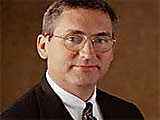
Geneva, Switzerland
info@astonesthrow.ch

By Philip Stone
Eason Jordan,
CNN’s longtime senior global news executive, has resigned because of
comments he made at the World Economic Forum (WEF) that US troops targeted
journalists in Iraq, something he retracted almost immediately. But it
wasn’t the US media that demanded his scalp for maligning the US
military – in fact the US media didn’t even report the story until it
was almost over. So how did the pressure become so great that CNN decided
to cut its losses and let him walk the plank? Because the bloggers had
Jordan by the short  hairs and they
were not letting go.
hairs and they
were not letting go.
It was yet another important story for which the traditional media tried to play catch-up. The people who actually broke the story were not professional journalists working for established publications, but rather so-called bloggers – individuals who are now more often reporting the major stories that previously we had relied upon the traditional media to break.
And before you dismiss the power and reach of such independent writing, the Truth Laid Bear website which tracks web usage says that at least 847 different blog sites talked about the Jordan story with a combined visit total of 924,596 daily – a “circulation” more than most US daily newspapers.
In the CBS/Dan Rather debacle during the US election, it was the bloggers who immediately wrote that the documents CBS was relying upon for its story about President Bush and his time in the National Guard were not reliable, and 14 days later CBS admitted that was true. The traditional media played catch-up on that story, too.
Both cases have left the traditional media open to accusations that when it comes to covering their own industry, and major personalities within it, that they tend to shy away. And the bloggers are now proving they won’t allow the media any such latitude in the future.
The Jordan case is a textbook example of a story the traditional media should have broken but didn’t. Jordan was among a number of distinguished panelists in Davos at a WEF symposium entitled “Will Democracy Survive the Media?” The symposium was videotaped by the organizers, but the session was called “off the record” so the tape has not been released. Journalists often cover “off the record” proceedings by not naming names, but the events are fair game. In fact it was the unofficial WEF blog site that broke the story – names and all.
During the debate discussion got around to Iraq – the most dangerous killing grounds in the world for journalists these days. Jordan said he was aware of 12 journalists that had been killed by US forces (this has never been denied) and they had in fact been targeted for killing (that was new). During the course of discussion he made the claim several times, but when challenged by US House of Representatives member Barney Franck, also a panel member, he apparently came to understand he had misspoken and backpedaling furiously he clarified that he did not mean they were killed because they were journalists but they were specific targets perhaps because someone took them for insurgents.
But the damage was done. Bottom line – what he said became so confusing it was a complete mess. The highly charged and seemingly anti-American partisan audience really got into it, and it seemed each nationality heard only what it wanted to hear. The message taken away by the Middle East attendees was that the US military considered journalists fair game (Arab news organizations in Iraq have felt, literally, US military firepower on several occasions as have western news organizations.)
One member of the audience, US Senator Christopher Dodd, was not amused at hearing the US military being bashed in such a way. Neither was the panel’s chairman, David Gergen, one of America’s most respected political experts who served in both a Democratic and a Republican White House and who is now the Director of Public Leadership at the John F. Kennedy School of Government at Harvard University as well as editor at large for US News and World Report Magazine.
It is not known how many US media attended the session, but at least one – Bret Stephens, editorial board member of the Wall Street Journal – was there, but he did not write a word on it until 10 days later when the bloggers were in full cry. Stephens then wrote that while Jordan had made a false accusation against the military, he had recanted almost immediately and should be forgiven. Not what the bloggers wanted to hear.
The first real traditional media piece came from Howard Kurz of the Washington Post. It must have been somewhat difficult to write since Kurz also hosts a weekly media program on CNN, but that, perhaps, gave him access to Jordan who further explained what he did and did not mean to say and the story was as even as one could hope. It did end, however, with Kurz quoting Gergen as saying “This guy was caught up in the tension of the moment. He deserves the benefit of the doubt.” Again, not what the bloggers wanted to hear.
Also coming to Jordan’s defense was another panelist, Richard Sambrook, director of BBC World Service and Global News. If ever there is an international news executive who understands the pressures Jordan was under after the event it is Sambrook, who was director of BBC News during the events covered in the Hutton Inquiry that ended with the chairman and director-general of the BBC losing their jobs. A few months after the inquiry’s report, Sambrook moved quietly to his current position.
Sambrook explained that what Jordan was trying to say was that many journalists killed by coalition forces in Iraq were indeed targeted – not because they were journalists but because whomever was firing at them probably thought they were insurgents. That is different to fatalities being caused by “collateral damage” from such events as bomb explosions and the like.
Sambrook, who leads an international committee of inquiry into why so many journalists around the word are now being killed, will be making recommendations to change international law so that when journalists are killed there is a proper, open investigation as to what happened.
But for all the explanations the bloggers continued their onslaught. And then unexpectedly Jordan was gone. CNN wished him all the best but there was a feeling that for whatever reason the company was not all that sad to see him go.
The bloggers, meanwhile, proved again that not only can they introduce a story into the journalistic mainstream, but they can definitely affect its final outcome. The power no longer rests with traditional media’s editorial (leader) pages.
And While We’re At It...
There is still
some good that can come from the Eason Jordan story if Senator Dodd and
Representative Frank are willing to use their influence. Some 30
media organizations including CNN, Reuters, ABC and the Boston Globe –
have complained to the  Pentagon
about events ranging from the death of journalists to intimidation, and
destruction of video tape etc., and the news organizations say the
responses have not been satisfactory. There have been discussions between
media groups and top levels of the Pentagon but still nothing. This has
created distrust in the working relationship, and presents the background
to why Jordan said what he said, but it came out wrong.
Pentagon
about events ranging from the death of journalists to intimidation, and
destruction of video tape etc., and the news organizations say the
responses have not been satisfactory. There have been discussions between
media groups and top levels of the Pentagon but still nothing. This has
created distrust in the working relationship, and presents the background
to why Jordan said what he said, but it came out wrong.
Dodd and Frank saw for themselves at Davos how many in the audience were willing to believe only the worst against American forces. The results of the various Pentagon investigations into several of the killings of journalists have left the media with one word in mind – stonewalling – and the anger simmers.
Frank and Dodd are Congressional veterans who have the power and influence to get to the bottom of why journalists have died in Iraq from American firepower. The military and the media need closure on this issue. Dodd and Frank could help make that happen.
© Philip M. Stone of Stone & Associates, a partner in followthemedia.com